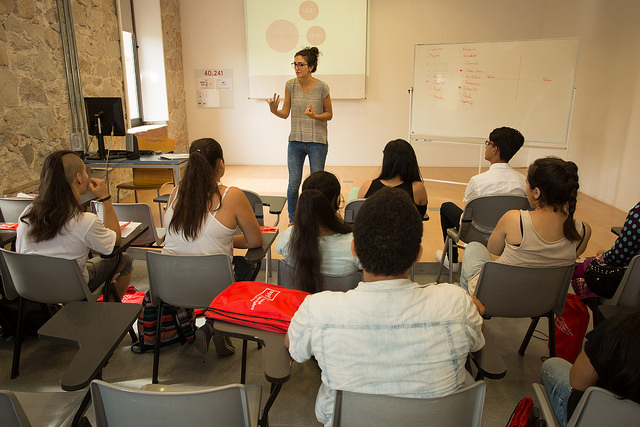The team, coordinated by Gema Revuelta through the Science, Communication and Society Studies Centre at Pompeu Fabra University, has published a scientific article based on political documents, academic articles, projects and interviews in Science and Engineering Ethics.
The article “Teaching Responsible Research and Innovation, a Phronetic Perspective” published in Science and Engineering Ethics by Springer explores in-depth what it means to teach RRI in university education. It is based on a thorough analysis coordinated by Niels Mejlgaard (Aarhus University), member of HEIRRI and first author of the study. This analysis examines more than 250 political documents, 77 academic articles, 55 European projects, 17 interviews with experts, and a consultation via specialized networks in RRI and members of the advisory boards of the HEIRRI project.
It explains that all teaching of RRI must invoke in the students a sense of social responsibility. The text argues that Aristotle’s concept of “phronesis” covers the key properties of educational activities in RRI, in so much that this teaching should nurture students with practical wisdom and ethics, and ensure that at the end of learning they should have the necessary skills to act responsibly in contexts characterized by uncertainty, discord and controversy.
For UPF, in addition to Gema Revuelta, lecturers Mar Carrió and Gemma Rodríguez (from the research group on Education in Health Sciences), and Núria Saladié, HEIRRI project manager also participated.
About the HEIRRI project
The HEIRRI project is coordinated by Gema Revuelta, director of the Science, Communication and Society Studies Centre at UPF (CCS-UPF). At UPF, HEIRRI is composed of a multidisciplinary team made up of members of the Department of Experimental and Health Sciences and of the Department of Information and Communication Technologies. The other participants in the project are the University of Aarhus (Denmark), the University of Bergen (Norway), the University of Split(Croatia), the Institute of Advanced Studies (Austria), the Fundació “la Caixa” (Barcelona), the company Innovatec (Madrid), the European network of museums and science centres, Ecsite, and the Catalan Association of Public Universities (ACUP, which chairs GUNi, the Global University Network for Innovation, with 208 universities in 78 countries). The project is funded by the European Commission’s Horizon 2020 programme.
HEIRRI is committed to solid education in RRI during all stages of higher education for research and innovation to be able to solve global social problems. With this in mind, HEIRRI has designed educational programmes for undergraduate, postgraduate and master’s degrees, doctorates, workshops for teaching staff, a MOOC and a summer school to integrate the teaching of RRI in higher education institutions. Currently these educational programmes are being piloted internationally.










